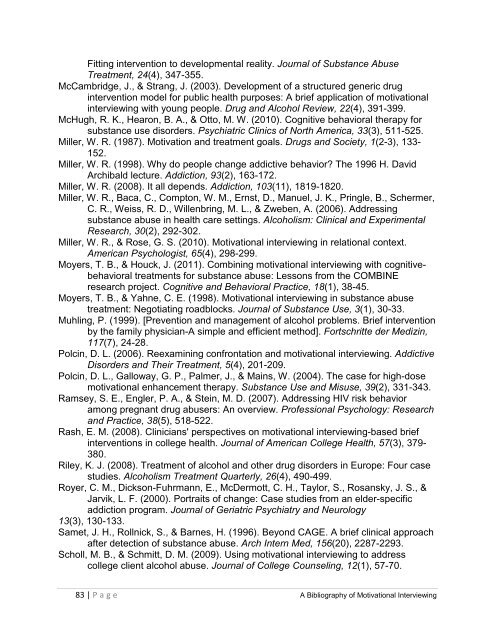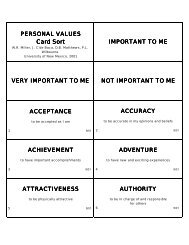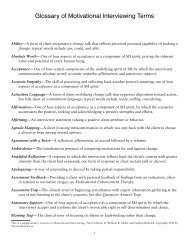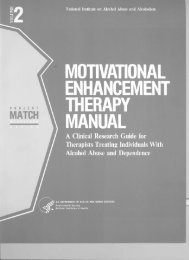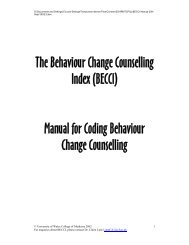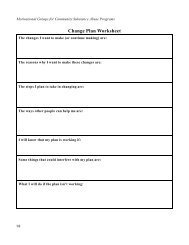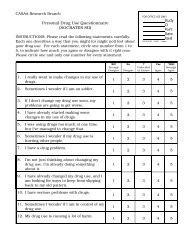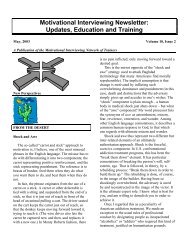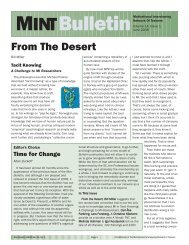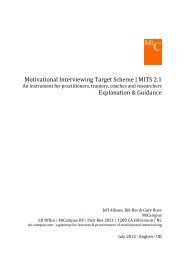Diamond, G., Godley, S. H., Liddle, H. A., Sampl, S., Webb, C., Tims, F. M., & Meyers,R. (2002). Five outpatient treatment models for adolescent marijuana use: Adescription <strong>of</strong> the cannabis youth treatment interventions. Addiction, 97(Suppl.1), 70-83.DiClemente, C. C., Bellino, L. E., & Neavins, T. M. (1999). Motivation for change andalcoholism treatment. Alcohol Research and Health, 23(2), 86-92.Dzialdowski, A., & London, M. (1999). A cognitive behavioural intervention in thecontext <strong>of</strong> methadone tapering treatment for opiate addiction—Two single cases.Clinical Psychology and Psychotherapy, 6(4), 308-323.Engle, D. (2008). Viewing resistance as ambivalence: Integrative strategies for workingwith resistant ambivalence. Journal <strong>of</strong> Humanistic Psychology, 48(3), 389-412.Futterman, R., Lorente, M., & Silverman, S. (2004). Integrating harm reduction andabstinence-based substance abuse treatment in the public sector. SubstanceAbuse, 25(1), 3-7.Gintner, G. G., & Choate, L. H. (2003). Stage-matched motivational interventions forcollege student binge drinkers. Journal <strong>of</strong> College Counseling, 6(2), 99-113.Graham, J. (2004). <strong>Motivational</strong> interviewing: A hammer looking for a nail? Journal <strong>of</strong>Psychiatric and Mental Health Nursing, 11(4), 494-497.Griffith, L. J. (2008). The psychiatrist's guide to motivational interviewing. Psychiatry,5(4), 42-47.Hanson, M., & Gutheil, I. A. (2004). <strong>Motivational</strong> strategies with alcohol-involved olderadults: Implications for social work practice. Social Work, 49(3), 364-372.Harris, R. S., Jr., Aldea, M. A., & Kirkley, D. E. (2006). A motivational interviewing andcommon factors approach to change in working with alcohol use and abuse incollege students. Pr<strong>of</strong>essional Psychology: Research and Practice, 37(6), 614-621.Heather, N. (2005). <strong>Motivational</strong> interviewing: Is it all our clients need? AddictionResearch and Theory, 13(1), 1-18.Hohman, M. M. (1998). <strong>Motivational</strong> interviewing: An intervention tool for child welfarecase workers working with substance-abusing parents. Child Welfare, 77(3), 275-289.Irwin, T. W. (2006). Strategies for the treatment <strong>of</strong> methamphetamine use disordersamong gay and bisexual men. Journal <strong>of</strong> Gay and Lesbian Psychotherapy, 10(3-4), 131-141.Kurz, M. (2003). Early intervention strategies in substance abuse. Journal <strong>of</strong> NeuralTransmission Supplementum(66), 85-96.Lapham, S. C., Chang, I., & Gregory, C. (2000). Substance abuse intervention forhealth care workers: A preliminary report. Journal <strong>of</strong> Behavioral Health Servicesand Research, 27(2), 131-143.Levounis, P., & Ruggiero, J. S. (2006). Outpatient management <strong>of</strong> crystalmethamphetamine dependence among gay and bisexual men: How can it bedone? Primary Psychiatry, 13(2), 75-80.Longabaugh, R., Zweben, A., Locastro, J. S., & Miller, W. R. (2005). Origins, issues andoptions in the development <strong>of</strong> the combined behavioral intervention. Journal <strong>of</strong>Studies on Alcohol Supplement(15), 179-187.Masterman, P. W., & Kelly, A. B. (2003). Reaching adolescents who drink harmfully:82 | P ageA <strong>Bibliography</strong> <strong>of</strong> <strong>Motivational</strong> <strong>Interviewing</strong>
Fitting intervention to developmental reality. Journal <strong>of</strong> Substance AbuseTreatment, 24(4), 347-355.McCambridge, J., & Strang, J. (2003). Development <strong>of</strong> a structured generic drugintervention model for public health purposes: A brief application <strong>of</strong> motivationalinterviewing with young people. Drug and Alcohol Review, 22(4), 391-399.McHugh, R. K., Hearon, B. A., & Otto, M. W. (2010). Cognitive behavioral therapy forsubstance use disorders. Psychiatric Clinics <strong>of</strong> North America, 33(3), 511-525.Miller, W. R. (1987). Motivation and treatment goals. Drugs and Society, 1(2-3), 133-152.Miller, W. R. (1998). Why do people change addictive behavior? The 1996 H. DavidArchibald lecture. Addiction, 93(2), 163-172.Miller, W. R. (2008). It all depends. Addiction, 103(11), 1819-1820.Miller, W. R., Baca, C., Compton, W. M., Ernst, D., Manuel, J. K., Pringle, B., Schermer,C. R., Weiss, R. D., Willenbring, M. L., & Zweben, A. (2006). Addressingsubstance abuse in health care settings. Alcoholism: Clinical and ExperimentalResearch, 30(2), 292-302.Miller, W. R., & Rose, G. S. (2010). <strong>Motivational</strong> interviewing in relational context.American Psychologist, 65(4), 298-299.Moyers, T. B., & Houck, J. (2011). Combining motivational interviewing with cognitivebehavioraltreatments for substance abuse: Lessons from the COMBINEresearch project. Cognitive and Behavioral Practice, 18(1), 38-45.Moyers, T. B., & Yahne, C. E. (1998). <strong>Motivational</strong> interviewing in substance abusetreatment: Negotiating roadblocks. Journal <strong>of</strong> Substance Use, 3(1), 30-33.Muhling, P. (1999). [Prevention and management <strong>of</strong> alcohol problems. Brief interventionby the family physician-A simple and efficient method]. Fortschritte der Medizin,117(7), 24-28.Polcin, D. L. (2006). Reexamining confrontation and motivational interviewing. AddictiveDisorders and Their Treatment, 5(4), 201-209.Polcin, D. L., Galloway, G. P., Palmer, J., & Mains, W. (2004). The case for high-dosemotivational enhancement therapy. Substance Use and Misuse, 39(2), 331-343.Ramsey, S. E., Engler, P. A., & Stein, M. D. (2007). Addressing HIV risk behavioramong pregnant drug abusers: An overview. Pr<strong>of</strong>essional Psychology: Researchand Practice, 38(5), 518-522.Rash, E. M. (2008). Clinicians' perspectives on motivational interviewing-based briefinterventions in college health. Journal <strong>of</strong> American College Health, 57(3), 379-380.Riley, K. J. (2008). Treatment <strong>of</strong> alcohol and other drug disorders in Europe: Four casestudies. Alcoholism Treatment Quarterly, 26(4), 490-499.Royer, C. M., Dickson-Fuhrmann, E., McDermott, C. H., Taylor, S., Rosansky, J. S., &Jarvik, L. F. (2000). Portraits <strong>of</strong> change: Case studies from an elder-specificaddiction program. Journal <strong>of</strong> Geriatric Psychiatry and Neurology13(3), 130-133.Samet, J. H., Rollnick, S., & Barnes, H. (1996). Beyond CAGE. A brief clinical approachafter detection <strong>of</strong> substance abuse. Arch Intern Med, 156(20), 2287-2293.Scholl, M. B., & Schmitt, D. M. (2009). Using motivational interviewing to addresscollege client alcohol abuse. Journal <strong>of</strong> College Counseling, 12(1), 57-70.83 | P ageA <strong>Bibliography</strong> <strong>of</strong> <strong>Motivational</strong> <strong>Interviewing</strong>
- Page 4 and 5:
New York, NY: Guilford Press.Burke,
- Page 6 and 7:
diagnostic interviewing (2nd ed., p
- Page 8 and 9:
& R. D. Maiuro (Eds.), Motivational
- Page 10 and 11:
MI. In W. R. Miller & S. Rollnick (
- Page 12 and 13:
psychiatry. Canadian Journal of Psy
- Page 14 and 15:
Addictive Behaviors, 32(11), 2439-2
- Page 16 and 17:
evaluations. Addiction, 99(Suppl. 2
- Page 18 and 19:
& Rassaf, T. (2008). Clinical resea
- Page 20 and 21:
Self-regulation and weight reductio
- Page 22 and 23:
*T Fuemmeler, B. F., Mâsse, L. C.,
- Page 24 and 25:
Terry, M. (2002). Motivational inte
- Page 26:
interviewing (GMI) for psychiatric
- Page 29 and 30:
Family/Relationships*F Barkin, S. L
- Page 31 and 32: Verbanck, P., & Kornreich, C. (2008
- Page 33 and 34: *IT Prochaska, J. O., Butterworth,
- Page 35 and 36: Association, 108(6), 1029-1032.*I W
- Page 37 and 38: Medicine, 34(2), 177-187.*I Robles,
- Page 39 and 40: evaluation of a new, manual-guided
- Page 41 and 42: Research and Therapy, 48(10), 941-9
- Page 43 and 44: motivational interviewing for femal
- Page 45 and 46: American Journal on Addictions, 12(
- Page 47 and 48: *I Allsop, S., Saunders, B., Philli
- Page 49 and 50: G Breslin, C., Li, S., Sdao-Jarvie,
- Page 51 and 52: F., & Bets, D. (2002). Does psychos
- Page 53 and 54: among male heavy drinkers identifie
- Page 55 and 56: *G LaBrie, J. W., Huchting, K., Taw
- Page 57 and 58: *I McCambridge, J., Slym, R. L., &
- Page 59 and 60: Castro, V., Khalilifard, F., George
- Page 61 and 62: evaluating the impact of quarterly
- Page 63 and 64: Work Practice, 11(4), 458-472.*I Th
- Page 65 and 66: Sustained-release bupropion for smo
- Page 67 and 68: *IT Groeneveld, I. F., Proper, K. I
- Page 69 and 70: (2006). Efficacy of telephone couns
- Page 71 and 72: time to address gaps in care. Disea
- Page 73 and 74: and Practice, 14(1), 58-63.Martino,
- Page 75 and 76: 85.Loxterkamp, D. (2009). A change
- Page 77 and 78: Medical AdherenceAliotta, S. L., Vl
- Page 79 and 80: of a group treatment for enhancing
- Page 81: Golin, C. E., Davis, R. A., Przybyl
- Page 85 and 86: Delivery FormatLetters in front of
- Page 87 and 88: Bugelli, T., & Crowther, T. R. (200
- Page 89 and 90: adoption study. Journal of Teaching
- Page 91 and 92: Moyers, T. B., Martin, T., Manuel,
- Page 93 and 94: Amrhein, P. C., Miller, W. R., Yahn
- Page 95 and 96: 31(Suppl. S3), 40S-47S.Moyers, T. B
- Page 97 and 98: (2007). Social psychology and motiv
- Page 99: motivational interviewing: Reliabil


